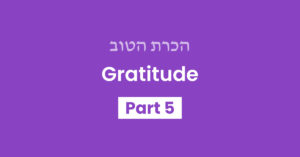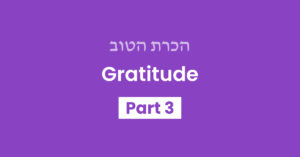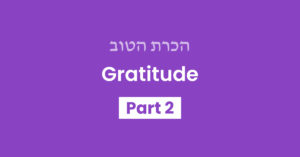Which middah is the most fundamental? Which middah is the basis for all other middos, such that we should work on this middah before all other middos?
While there are many middos that can arguably be considered “the most fundamental middah” – Hakaras HaTov (Gratitude) is definitely high on the list.
Why?
In the very first passuk of the Torah, Rashi explains “Bereishis” to mean that the world was created “bishveel Raishis” – for the sake of “the first” (Raishis).
What is this great Raishis for which the entire world was created?
The entire world was created for the sake of “Raishis” – but what is “Raishis”?
Rashi explains Raishis to mean either (1) the Torah, or (2) the Jewish people, both of which are called “the first one” in certain pesukim. These explanations are easy to understand – the Torah and the Jewish people are definitely very important things! We can easily understand how Hashem would create the entire world for the sake of the Torah, or for the sake of the Jewish people.
However, the Midrash1 adds a third explanation:
Raishis refers to the mitzvah of Bikkurim – the mitzvah for Jewish farmers to bring the first fruits of their harvest to the kohen in the Beis HaMikdash.
At first glance, this explanation is very puzzling! We can understand why Hashem would create the world for the sake of the Torah, or for the sake of the Jewish people, but why would He create the world just for the sake of one mitzvah – the mitzvah of offering Bikkurim – bringing the first fruits to the Beis HaMikdash? What’s so special about the mitzvah of Bikkurim?
The Alshich HaKadosh2 explains: The mitzvah of offering Bikkurim is our way of giving thanks to Hashem for everything He gives us. When a farmer takes the first fruits of his crop, puts them in a basket, and brings them to the Beis HaMikdash, he is demonstrating his recognition that he did not create these fruits with his own power, but rather, these fruits are gifts from Hashem! Hashem created the seeds; Hashem created the intricate and complicated mechanisms to allow each seed to grow; Hashem made it rain; Hashem gave the farmer the energy to harvest his crops, etc. If a farmer would keep his crops all to himself, he might begin to take credit for his fruits and forget to thank Hashem for the fruits! Therefore, Hashem instructed each farmer to bring the first of his fruits to the Beis HaMikdash, to demonstrate our appreciation for these fruits and our recognition that the fruits were created by Hashem.
That’s why the Midrash says that the whole world was created for the sake of Bikkurim… because the entire purpose of Creation is that we should recognize Hashem as our Creator, and give thanks to Him!
The whole purpose of the world is that we should recognize Hashem as our Creator, and give thanks to Him!
Similarly, the Ramban3 writes that “the purpose of all mitzvos is that we should believe in Hashem and give thanks to Him for creating us, and there is no other purpose known for Creation other than this!” If so, then whenever we express appreciation to Hashem, we are fulfilling the entire purpose of Creation!
And, on the flip side… the Pirkei D’Rebbi Eliezer (Chapter 7) writes: “There is nothing harder for Hashem to live with (as it were) than an ungrateful person.”
Hakaras HaTov may be divided into two aspects:
(a) Thanking people (b) Thanking Hashem.
Chazal reveal to us that in order to feel real deep gratitude to Hashem, we must strengthen our ability to express gratitude to people, as well.
As the Midrash4 states:
“Someone who does not give thanks to PEOPLE, may ultimately fail to express gratitude to HASHEM, too – and even deny Hashem’s existence!”
Therefore, let’s begin to work on our middah of Hakaras HaTov by putting in some extra effort to notice many of the ways we are benefiting from other people, and express appreciation for these benefits.
Sources: [1] Bereishis Rabbah 1:6; [2] Alshich at the beginning of Ki Tavo – Devarim 26:1; [3] Ramban at the end of Parshas Bo; [4] Midrash HaGadol on Shemos 8, quoted in Sefer Chochmah U’Mussar 2:11 and discussed at length in Sifsei Chaim Middos V’Avodas Hashem Vol. II pages 336-342
Your Challenge
Once a day, express your appreciation to someone either in person, over the phone, or by writing a letter or email.
After saying “Thank You,” explain why you appreciate it, or how your life would be different if you would not have received their help.
For example:
- “Thank you so much for giving me a ride in your car! Without your help, I would have taken the subway, which would have been much less comfortable and I would have gotten to work 15 minutes later.”
- “Thank you so much for picking that piece of paper off the floor. It gives me such pleasure to see clean floors.”
You can say this “Thank You” to someone you know personally, or send it to an organization or company that did something to benefit you.
Torah Questions
- Where in the Torah do we see that the creation of the world was held up (i.e. something could not be created yet) because the power of appreciation was not yet in place? (Hint: See Rashi on Bereishis Perek 2)
- Who was the FIRST person to be kafoi tov (fail to appreciate gifts that were given to him or her), and what gift did they fail to appreciate?
- How did Avraham Avinu help people have hakaras hatov (gratitude) to Hashem? (Hint: See Sotah 10b)
- The Midrash (Shemos Rabbah 1:8) writes that a person who is kafoi tov (fails to express gratitude) to people may ultimately fail to express gratitude to Hashem, too – and even come to deny Hashem’s existence. Which person in the Torah was kafoi tov to a person, and later was kafoi tov to Hashem and even denied Hashem’s existence?
Questions to Ponder
- The Midrash (Shemos 1:8 and Devarim 5:6) says that a person who is kafoi tov (fails to express appreciation) is not able to be Mekabeil Ol Malchus Shamayim (accept the yoke of Heaven upon himself). Why do you think this is the case?
- The Sifsei Chaim (Middos V’Avodas Hashem, Vol. II, page 377) writes that someone who does not give thanks to people may ultimately fail to express gratitude to Hashem, too – and even deny Hashem’s existence (kefirah)! Why do you think these two traits are related? How does failing to express gratitude to people lead to denying Hashem’s existence?
- The Gemara states: “Ha’omer davar bisheim omro, meivee geulah l’olam– Anyone who quotes an idea in the name of the person who originally said it, brings redemption to the world.” (Megillah 15a) Why do you think it’s so important to quote an idea in the name of the person who originally said it? How does this bring redemption to the world? (Why didn’t the Gemara say it brings happiness, clarity, blessing, or any other type of good thing?) And how does this concept relate to the importance of expressing gratitude?






